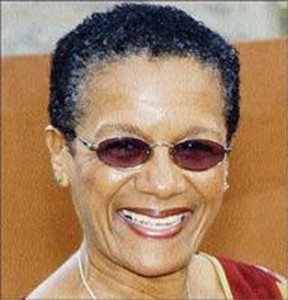Caribbean media practitioners need to improve their command of the English Language and continuously educate themselves if they are to become critical thinkers and understand the linkages of issues to the rest of the region and the world.

This is according to well-known Jamaican media practitioner, lecturer and actress, Fae Ellington, who in a hard-hitting speech to her colleagues at last Sunday evening’s Digicel media dinner at the Pegasus implored journalists to educate themselves and to cooperate while they compete.
Having done these things, Ellington said, journalists, in a world of emerging technology, will be able to lobby their governments in the region to make new media products more accessible at more affordable rates to the larger communities and sections of the population that do not have access to the technologies. She stressed that it is a fight for the opening up of media practitioners’ minds and that it is imperative that they change the old “mindset”.
“It is critical that we look for solutions outside of the box. We need to be innovative,” Ellington said.
“Speech is music with rhythm, find it,” was probably the most powerful line in Ellington’s speech which was peppered with a few jokes, but so filled with the home truths that it had many present at the dinner squirming in their seats.
Ellington, who tutors at the Caribbean Institute of Media and Communication (Carimac) and has been involved in the media for the past 30 years, said she was aware that she would have made few friends, but what she was saying needed to be told as she was more than embarrassed “when I see those captions with misspelling around the region”.
She urged the journalists, some of whom were listening with rapt attention, to improve their command of English on all fronts.
“Contrary to a long-held popular belief, Caribbean media practitioners have a lot to learn about speaking English.
Our oral skills are at best mediocre,” Ellington said. She pointed to journalists who live in bilingual societies where English is the official language, but not the first language; not the language of the majority of people and certainly not the language in which they think.
And she delivered a line she usually kept for students: “With confidence comes competence and competence feeds confidence.”
Ellington pointed out that the media landscape affords great opportunities. However, if media practitioners do not have the competitive edge they will remain in the cocoon of local media with little or no global reach. “This is the time to market yourself, your culture, your country and your region. However, this will not happen if we do not address the fundamentals.” And in the media business, Ellington pointed out, the most important plank, after common sense, is a good command of English as it provides the obvious competitive edge.
“We must return to the basics:
Put the ‘Hs’ and ‘Ths’ where they belong;
Recognise that there are ‘Hs’ that are aspirated and others that are not;
Understand that word endings need to be valued;
Recognise that there is a difference between ‘in’ and ‘ing’;
Learn the rules of pronunciation;
Nouns have the emphasis on the first syllable, verbs and adjectives on the second;
Get a grip on how to manage polysyllabic words, words with three or more syllables; the stress is usually on the third syllable from the end; not the beginning.
“Strike up a lasting relationship with your dictionary – one that has not only meaning but pronunciation — it matters.”
Ellington noted that many persons throughout the Caribbean are gaining grade ones in CXC English and are graduating from universities with first class honours degrees but yet cannot speak English.
And media practitioners need to get to a place where they are no longer satisfied with being trained but they also need to be schooled and educated and this should be continuing.
Ellington questioned the point of being a deft editor in the use of technology, but yet not au fait with the issues and nuances of the footage, the faces of the key speakers, the contents of the interview, or the spin of the political speech. “It makes little sense if you are unable to determine what makes news and what doesn’t. You ought to be able to bring critical analysis to bear on the subject/issue but too many of us are far removed from understanding the issue let alone the linkages to the rest of the region and the wider world.”




